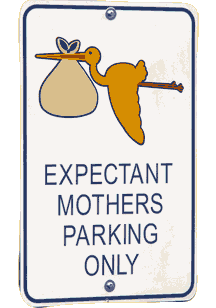Some Fine Print Relating to the Law of OR
Once again, The Law of OR says, if you need to know the probability that one thing OR another will take place, just add their separate probabilities.
 Of course it's not (quite) that simple. Here's the fine print: the events
in question have to be mutually exclusive. In other words, you will
win one prize, but not two, or three, or four.
Of course it's not (quite) that simple. Here's the fine print: the events
in question have to be mutually exclusive. In other words, you will
win one prize, but not two, or three, or four.
Here are some mutually exclusive events:
- Your friend is pregnant OR not pregnant;
as we all know, there's no such thing as a little pregnant. - Your mother offers you cake OR a brownie for
dessert.
You can't get both! - You have one dollar. You can buy fries OR
a donut OR a small milkshake,
but after you buy one thing, your money's gone, you're out of luck.
Here are some non-mutually exclusive events:
- Your grandmother offers you cake OR a brownie
OR both.
But take both dear, you're too skinny! - Your friend has a cold OR a flu OR
maybe both,
she looks so miserable. - You just got paid, to celebrate you could get fries OR
a donut OR a small milkshake
OR any combination of the above.
 Which of the following sets of choices are mutually exclusive?
Which of the following sets of choices are mutually exclusive?
the chance of rain or snow in the forecast tomorrow?
(To make this problem interactive, turn on javascript!)
- I need a hint ... : it could be both
- ...another hint ... : not mutually exclusive
I think I have the answer: NO
 the likelihood that you left your keys in your pocket or your backpack?
the likelihood that you left your keys in your pocket or your backpack?
(To make this problem interactive, turn on javascript!)
- I need a hint ... : keys can only be in a single place at once
- ...another hint ... : the two possibilities are mutually exclusive (but
again, not exhaustive)
I think I have the answer: YES

the chance that your father OR your mother have curly hair?
(To make this problem interactive, turn on javascript!)
- I need a hint ... : its possible that both of your parents could have curly hair
- ...another hint ... : these are not mutually exclusive
I think I have the answer: NO
Copyright University of Maryland, 2007
You may link to this site for educational purposes.
Please do not copy without permission
requests/questions/feedback email: mathbench@umd.edu